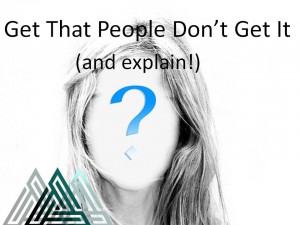
Someone without a chronic, progressive disease doesn’t understand what that’s like. And most people won’t recognize specific PD symptoms. A peculiar gait and impaired movements are not understood, much less a tremor or blank facial expression and the mental processes behind those.
So many people don’t understand and tend to react with irritation and judgment.
To cope with that it probably helps if you have a clearer understanding of why people react the way they do. And know what to do in response. Below you’ll find:
• Why reacting with any nuance is all but impossible for most people
• Why people react with negative judgments
• What you can do to cope with that
• How to respond
WHY ARE NUANCED REACTIONS SO HARD?
The world is literally much too complex to handle everything with nuance. Every second of every day more information reaches you than you can possibly process. You unconsciously ignore what is ‘normal’ and focus on things that are out of the ordinary. So it is most comfortable when everything around you goes as expected. This calls for the least attention and effort!
Judging quickly is a survival skill. If any danger lurks, you’d better spot it right away so you can get to safety quick. In other words: when people see something they don’t understand, they automatically feel discomfort.
SO WHY DO PEOPLE REACT NEGATIVELY TO PARKINSON’S?
As we’ve just seen, people unconsciously view deviations from what’s normal as risky.
They’ll try anything to root out whatever is different. And ‘anything’ may include ignore, badmouth, judge, verbally attack etc.
And when they see someone with PD, they may think he or she is drunk and say something about it.
WHAT CAN YOU DO TO HANDLE THIS BEHAVIOR?
What people lack in order to act decent around a PD patient is:
• Some working knowledge of what PD is
• A rough idea of PD symptoms
• The ability to stand in the PD patients shoes (empathy)
Now that you understand what makes people do what they do, it probably is a little easier to not get frustrated or angry over it. You may actually have a little empathy towards them. You now get that:
• The other person lacks knowledge
• His/her reaction is a natural one
• It probably isn’t their intention to offend you, but to make the world a bit more understandable (less disturbing and safer)
SO WHAT CAN YOU SAY TO INFORM THEM AND EASE THEIR MIND?
First of all: You don’t have to do that all the time! Pick your ‘battles’. Choose the situations you put effort into and choose them well. In many cases it is enough to understand that the other person doesn’t get it, not bother about it and to leave it at that. It’s not your responsibility!
In other case it may be in your own best interest to give them some clarity.
What you at least could do is tell them what’s going on, what the consequences are, that there is no problem and possibly what help you could use right now.
ASK FOR HELP
My friend Kees shared a great example on FaceBook the other day:
He wanted to buy a book but couldn’t get his wallet out of his pocket. Behind him people were beginning to sigh with impatience (or did he only imagine that?). He considered leaving without the book, but decided instead to ask a bystander to help him with his wallet. What he said exactly, I dont know, but it might have been something along the lines of:
• “Could you maybe help me? I can’t seem to take my wallet from my pocket.”
• Possibly complemented with “I have Parkinson’s and sometimes my hands shake a little too much.”
It may be a stretch at first to tell a stranger something like this, but I think the beauty of it is that you yourself:
• take the initiative,
• take responsibility for the situation,
• help the other person to understand and empathise,
• show that you can constructively handle any reaction you get, no matter how awkward.
Just a quick afterthought: Realize what the effect of your request for help is! You could see it as an admission to weakness, but then you would oversee an important point:
You put the other person in a situation where they can do you a small favor. That activates their social side and gives them the opportunity to ‘do good’ and feel good about themselves. And in all of this you’ve got the initiative!
I’d love to hear what you think, what questions you have and how you apply this. Please drop me a line below!
Warmest regards,
Koen Lucas, Health Coach

Wim Koning
juli 6, 2015 at 5:31ameducation and advice in one blog.
Dave Seabaugh
juli 10, 2015 at 5:13amI have commented to several people on the phone when they are giving me information that I have Parkinson’s disease and sometimes they express that they are sorry while others say ok. They do slow down so I can copy the information down. Sometimes they have a family member or a friend who has Parkinson’s. In the public I have encountered the same situations and responded to them in similar fashion. It is not only our responsibility to learn as much as we can but it is also the responsibility of the people who don’t have our particular type of illnesses. I hope and pray every day someone comes up with a lot of cures.
Praise the Lord
klucas
juli 10, 2015 at 4:11pmHi Dave, thanks for a good contribution. So you know it works to explain!